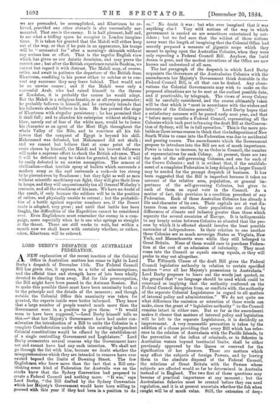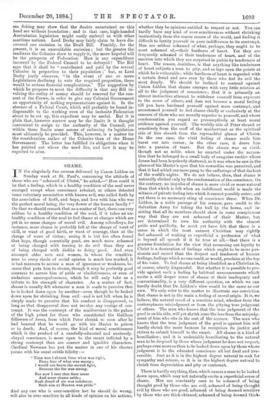LORD DERBY'S DESPATCH ON AUSTRALIAN FEDERATION.
ANEW explanation of the recent inaction of the Colonial Office in Australian matters has come to light in Lord Derby's despatch of December 11th. The Federal Council Bill has given rise, it appears, to a tribe of misconceptions, and the official time and strength have of late been wholly devoted to clearing them away. But for this preoccupation, the Bill might have been passed in the Autumn Session. But to make this possible there must have been unanimity both as to the principle and the details of the measure ; and though outside the Colonial Office this unanimity was taken for granted, the experts inside were better informed. They knew that a large number of people wanted much more than the Government were in a position to give them. "It would seem to have been supposed,"—Lord Derby himself tells us this,—" that her Majesty's Government have had under con- sideration the introduction of a Bill to unite the Colonies in a complete Confederation under which the existing independent Colonial constitutions would be effaced by the establishment of a single controlling Government and Legislature." Lord Derby enumerates several reasons why the Government have not and cannot have had any such intention. We shall not go through the list with him, because we doubt whether the misapprehensions which they are intended to remove have ever existed beyond the limits of Downing Street. The few Englialanteut who knew more than the fact that a Bill esta- blishing some kind of Federation for Australia was on the stocks know that the Sydney Convention had proposed to create a Federal Council and nothing more. "It was," says Lord Derby, "the Bill drafted by the Sydney Convention which her Majesty's Government would have been willing to proceed with this year if they had been in a position to do
so." No doubt it was ; but who ever imagined that it was anything else Very wild notions of the way in which government is carried on are sometimes entertained by out- siders; but we feel sure that the wildest of these notions never went the length .of imagining that the Colonial Office had secretly prepared a measure of gigantic scope which they meant to spring upon the Australian Colonies, when they were only expecting a Federal Council Bill. Anyhow, the lurid dream is gone, and the modest intentions of the Office are now known and understood of all men.
The last paragraph of the despatch in which Lord Derby acquaints the Governors of the Australasian Colonies with the amendments her Majesty's Government think desirable in the Federal Council Bill, is all that can be desired. Any obser- vations the Colonial Governments may wish to make on the proposed alterations are to be sent at the earliest possible date, and if practicable, by telegraph. The views of every Colony will be carefully considered, and the course ultimately taken will be that which is "most in accordance with the wishes and interests of the Colonies generally." Lord Derby hopes that a satisfactory measure will be passed early next year, and that "before many months a Federal Council, representing all the Colonies which took part in framing the draft Bill at the Conven- tion of Sydney, will be in fall operation." This is the more pro- bable as there seems reason to think that the indisposition of New South Wales to come into the Federation was due to accidental and passing causes. The amendments which the Government propose to introduce into the Bill are not of much importance. Power is taken to increase, by an Order in Council, the number of representatives for each Colony. At present, there are two for each of the self-governing Colonies, and one for each of the Crown Colonies ; and it is evident that, if the establish- ment of a completer Federation is long delayed, a larger Council may be needed for the prompt despatch of business. It has been suggested that the Bill is imperfect because it takes no account of the relative area, population, or general im- portance of the self-governing Colonies, but gives to each of them an equal vote in the Council. As a matter of fact, this provision is a condition precedent of any Federation. Each of these Australian Colonies has already a life and character of its own. Their capitals are at vast dis- tances from one another, their populations are divided by differences of climate and industry greater than those which separate the several countries of Europe. It is indispensable to any hearty union between Colonies so situated that the pro- cess by which it is effected should involve the least possible surrender of independence. Iii their relation to one another these Colonies are as much sovereign States as Virginia, New York, and Massachusetts were while they still belonged to Great Britain. None of them would care to purchase Federa- tion at the cost of an admission of inferiority. They must come into the Council as equals among equals, or they will prefer to stay out altogether.
The Fifteenth Clause of the draft Bill gives the Federal Council legislative authority in relation to certain specified matters "over all her Majesty's possessions in Australasia."
Lord Derby proposes to leave out the words just quoted, on the ground that "no language should be used which could be
construed as implying that the authority conferred on the Federal Council derogates from, or conflicts with, the authority of the separate Colonial Legislatures in regard to all matters of internal policy and administration." We do not quite see what difference the omission or retention of these words can make, since the grant of "legislative authority" to the Council remains intact in either case. But so far as the amendment makes it clearer that matters of internal policy and legislation will be left to the separate Legislatures, it is decidedly an improvement. A very reasonable precaution is taken by the addition of a clause providing that every Bill which has refer- ence to the relation of Australasia with the Pacific Islands, to the prevention of the influx of criminals, or to fisheries in Australian waters beyond territorial limits, shall be either previously approved by the Queen or reserved for the signification of her pleasure. These are matters which may affect the subjects of foreign Powers, and by leaving them to the absolute disposal of the Federal Council, the relations of Great Britain with the Powers whose subjects are affected would so far be determined in Australia instead of in England. The two first of these questions may become of practical importance at any moment ; but the Australasian fisheries must be created before they can need regulation, and it is at present uncertain whether the fish when caught will be of much value. Still, the extension of deep- sea, fishing may show that the doubts entertained on this head are without foundation ; and in that case, high-handed Australasian legislation might easily embroil us with other maritime nations. Lord Derby may fairly claim to have dis- covered one omission in the Draft Bill. Possibly, for the present, it is an unavoidable omission ; but the greater the readiness the Colonies show to supply it, the more hopeful will be the prospects of Federation. How is any expenditure incurred by the Federal Council to be defrayed ? The Bill says that it shall be "contributed and paid by the several Colonies in proportion to their population ;" but, as Lord Derby justly observes, "in the event of one or more Legislatures declining to vote the required proportion, there would be serious financial complications." The suggestion by which he proposes te meet the difficulty is that any Bill in- volving the outlay of money should be reserved for the con- sent of the Crown, in order to give any Colonial Government an opportunity of making representations against it. In the absence of a Federal Court, which will probably be found in- dispensable to the working even of the inchoate Federation about to be set up, this expedient may be useful. But it is plain that, however narrow may be the limits it is thought convenient to assign to the authority of the Council, yet within those limits some means of enforcing its legislation must ultimately be provided. This, however, is a matter for the consideration rather of the Colonies than of the Home Government. The latter has fulfilled its obligations when it has pointed out where the need lies, and how it may be expected to arise.







































 Previous page
Previous page